八年级英上册 Unit 5 My Future Lesson 33—36学案 冀教版
- 格式:doc
- 大小:55.50 KB
- 文档页数:4

冀教版英语八上Unit 5《My Future》(Lesson 25-26)英文教学设计一. 教材分析冀教版英语八上Unit 5《My Future》(Lesson 25-26)主要讲述了学生对于未来的规划和梦想。
本节课的主要内容包括一般将来时态的构成和用法,以及如何运用一般将来时态描述自己的未来计划和梦想。
本节课的学习对于学生来说非常重要,因为它涉及到学生对于未来的思考和规划,同时也有助于提高学生的英语水平。
二. 学情分析在教学之前,我们需要了解学生的基本情况。
大部分学生已经掌握了现在时态的用法,对于一般将来时态的构成和用法有一定的了解,但还需要进一步的巩固和提高。
学生的学习兴趣较高,但对于一些复杂的语法知识点还需要老师的耐心讲解和引导。
三. 教学目标1.学生能够掌握一般将来时态的构成和用法。
2.学生能够运用一般将来时态描述自己的未来计划和梦想。
3.学生能够提高自己的英语听说读写能力,为将来的学习和生活打下坚实的基础。
四. 教学重难点1.一般将来时态的构成和用法。
2.如何运用一般将来时态描述自己的未来计划和梦想。
五. 教学方法1.情境教学法:通过设定情境,让学生在实际语境中学习和运用英语。
2.任务型教学法:通过完成任务,让学生在实践中掌握英语知识。
3.互动式教学法:老师与学生互动,引导学生主动参与课堂,提高学生的英语水平。
六. 教学准备1.PPT课件:制作与本节课内容相关的PPT课件,包括图片、视频、动画等。
2.教学素材:准备一些与未来规划和梦想相关的素材,如图片、文章等。
3.教学卡片:制作一些一般将来时态的动词卡片,用于课堂操练。
七. 教学过程1.导入(5分钟)利用PPT课件展示一些与未来相关的图片,如科学家、医生、教师等职业图片,引导学生思考自己的未来规划。
然后询问学生:“What do you want to be in the future?”,让学生用英语表达自己的梦想。
2.呈现(10分钟)老师通过PPT课件介绍一般将来时态的构成和用法,如“I will be a teacher.”。
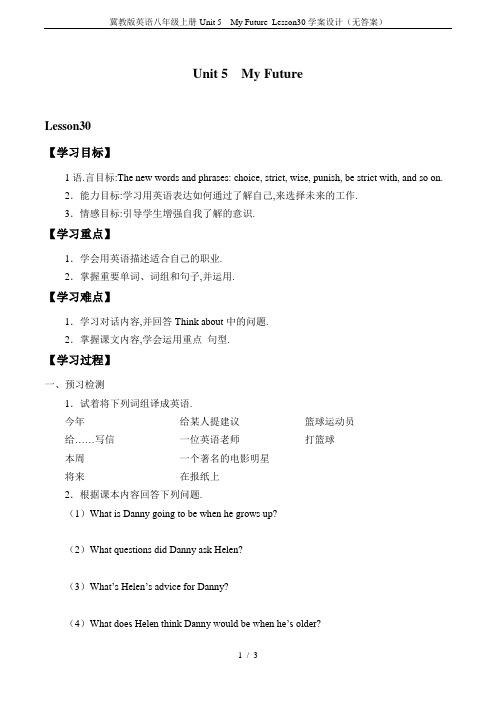
Unit 5 My FutureLesson30【学习目标】1语.言目标:The new words and phrases: choice, strict, wise, punish, be strict with, and so on.2.能力目标:学习用英语表达如何通过了解自己,来选择未来的工作.3.情感目标:引导学生增强自我了解的意识.【学习重点】1.学会用英语描述适合自己的职业.2.掌握重要单词、词组和句子,并运用.【学习难点】1.学习对话内容,并回答Think about中的问题.2.掌握课文内容,学会运用重点句型.【学习过程】一、预习检测1.试着将下列词组译成英语.今年________ 给某人提建议_______ 篮球运动员________给……写信_________ 一位英语老师_______ 打篮球____________本周_______________ 一个著名的电影明星____________________将来________________ 在报纸上_______________2.根据课本内容回答下列问题.(1)What is Danny going to be when he grows up?(2)What questions did Danny ask Helen?(3)What’s Helen’s advice for Danny?(4)What does Helen think Danny would be when he’s older?(5)Will Danny and LiMing be friends when they became rich?二、知识梳理1.much taller 意思是“高得多”.形容词比较级前还可用much, a lot, a little, even, far ,still 等词语来修饰.如:The sun is much bigger than the moon. 太阳比月亮大得多.He is a little thinner than me. 他比我瘦点儿.2.give advice to sb.给某人提建议,也可表述为give sb.advice.如:Please give me some good advice. 请给我一些好建议.=Please give some good advice to me.3.in the newspaper 在报纸上.如:There is something important in today’s newspaper.在今天的报纸上有重要的东西.注意:在报纸上用介词in 而不是on!4.Maybe I will be a famous movie star someday.有一天我会成为一个电影明星.(1)famous 形容词,“出名的,著名的”.常用的词组:be famous for 因...而著名(for用来表示原因)be famous as 以.....而出名(as后常接职业名称)例:Beijing is famous for the Great Wall.北京因长城而著名.Hangzhou is famous for the West Lake.杭州因西湖而著名.Yao Ming is famous as a basketball player.(2)someday. 可以写成some day. 意为“总有一天,有朝一日”,常与将来时连用.例:You’ll be famous someday.总有一天你会出名的.5.语法:句子的种类.英语的句子按用途分可分为四类:陈述句、疑问句、感叹句和祈使句.陈述句包括肯定句和否定句两种基本形式.我们以前都学习过.疑问句包括一般疑问句、选择疑问句、反意疑问句和特殊疑问句四种形式.一般疑问句和特殊疑问句我们以前都接触过很多,选择疑问句课本中也有例句,反意疑问句我们也学到过.感叹句是表示喜、怒、哀、乐等情绪的句子,句末常用感叹号.例如:What a good boy he is! How fast that man runs! 祈使句是表示请求、命令、叮嘱和号召的句子,句末常用感叹号.例如:Come in please! Be dangerous! 【达标检测】一、用所给的单词的适当形式填空1.Which one is ______ (big), this one that one?2.Do you want to be a ______ (play)?3.-When ______ he _______ (give) you advice? -Last week.4.I hope _____ (be) a film star.5.I think you’re much ________ (tall) this year than last year.6.Our teachers make us ________ (work) hard every day.二、拓展延伸句型转换.1.My father left Shanghai yesterday.(对画线部分提问)______ ______ your father _______ Shanghai?2.He wrote a book last year.(改为否定句)He ____ _____ ______ a book last year.3.I think. I’m not going to be a player.(并为一句)I ___ ___ think I ______ going to be a player.4.Lucy is taller than Lily.(改为同义句)Lily is _________ _________ Lucy.5.You can’t talk in class.(改为祈使句)________ ________ in class.6..We talked about our goals last Monday.(改为否定句)We _______ ________ about our goals last Monday.。
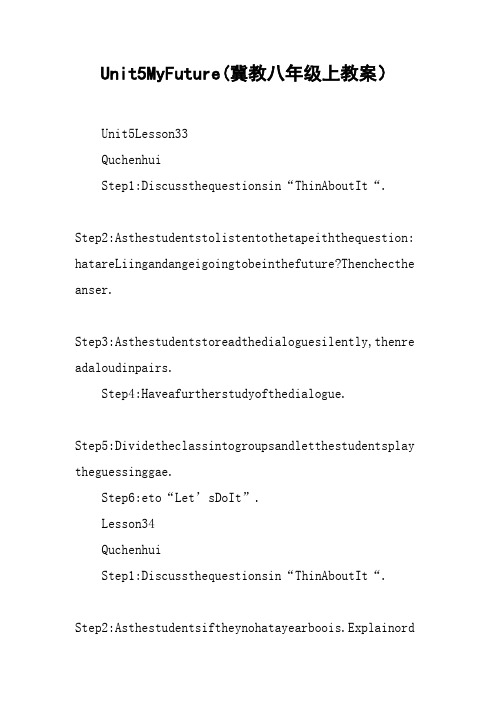
Unit5MyFuture(冀教八年级上教案)Unit5Lesson33QuchenhuiStep1:Discussthequestionsin“ThinAboutIt“.Step2:Asthestudentstolistentothetapeiththequestion: hatareLiingandangeigoingtobeinthefuture?Thenchecthe anser.Step3:Asthestudentstoreadthedialoguesilently,thenre adaloudinpairs.Step4:Haveafurtherstudyofthedialogue.Step5:Dividetheclassintogroupsandletthestudentsplay theguessinggae.Step6:eto“Let’sDoIt”.Lesson34QuchenhuiStep1:Discussthequestionsin“ThinAboutIt“. Step2:Asthestudentsiftheynohatayearboois.ExplainordeonstratetheeaningofyearbooeitherinchineseorinEngli sh.Step3:Asthestudentstocreateaindofyearboo.Step4:Talaboutthepicturetoseehatthestudentsundersta ndaboutthepicture.Asquestionlie:hatisLiingholdingup?Step5:Playthetapeforthestudentstolisten.Step6:Haveadiscussionaboutthetext.Step7:Asthestudentstooringroups.Predicttheirfuture. Usethesentenceslie:Iantto---Ihopeto---IhopethatIill.Step8:Beginunitproject1.aesurethestudentsfullyunder standhattheprojectrequiresthetodo.Dividetheclassintosallgroups.Eachgroupthenchoosesap artnergroup.Studentsineachgroupaepredictionsforthef utureaboutstudentsinthepartnergroup.Theyshouldaeone predictionforeverypersoninthepartnergroup.Asstudent storefertoLesson33inthisunitforproperording.Theysho uldalsobeencouragedtoexperientiththelanguagebyritin gintheironays.Instructeachgrouptoritealistoftheirpredictions.Astheclasstobreaintoitsgroups.Eachgroupexchangeitsl istofpredictionsithitspartnergroup.Everygroupshould nohavealistofpredictionsfroanothergroup.onestudentf roeachgroupcanreadthepredictionsaloud,orstudentscan taeturnsreadingpredictionsonebyone.Everygroupillthe ndiscusshethertheyagreeiththepredictions.Tourtheclassrooasthestudentstal.Ifanygroupsarehavin gtroubleexpressingtheselvesinEnglish,stoptheclassan dbrainstorusefulvocabularyithstudents.youayishtoaea listontheblacboard.Foryourreference,hereisalistofus efulords.ight,aybe,hope,ant,right,rong,goingto,ay,,illould,b ut,soeties,usually,surpriseIanttoIhopetoIthin/Idon’tthinGiveeachstudentapieceofpaper,allofthesaesize.Havethestudentsdraapictureoftheselvesinthefuture–hotheythintheyightlooasanadult.Eachstudentillthenri teapredictionforhisorheronfuture.Attheendofthissess ion,collectthesepapers.Puttheintoabinderofpredictio nsfortheclass.Leavethisbinderofpredictionsoutherest udentsayloothroughit.Iftheprojectcannotbefinishedinonelesson,itcanlastfo rtoorthreelessons.Lesson35Step1:Greatyourstudents,Helpthestudentsrespondinana ppropriateay.As,’ho’sonduty?’Listentothestudents’sreport.aesurethenextstudentfor“ho’sonduty?”noshoheorsheisfornexttie.Ifyouhavetie,youightastheclasstotrythefolloingtongu etister:Abigblacbugbitabigblacbear,adethebigblacbea rbleedblood.Step2:Giveyourclassatesorfriendssoeadvicebysayingiperativesentences.Step3:etoProject2.hat’syouradvice?Let’saeanadvicediaond.Explainthatadvicediaondsarepopula ea bigpieceofpaper,sothatallthestudentscanseehatyouare doing.Helpthestudentstoritetheadvicedon.Beginunitproject2.Instructthestudentshotoaean “advicediaond”.Refertotheillustratedinstructionso nthenexttopages。
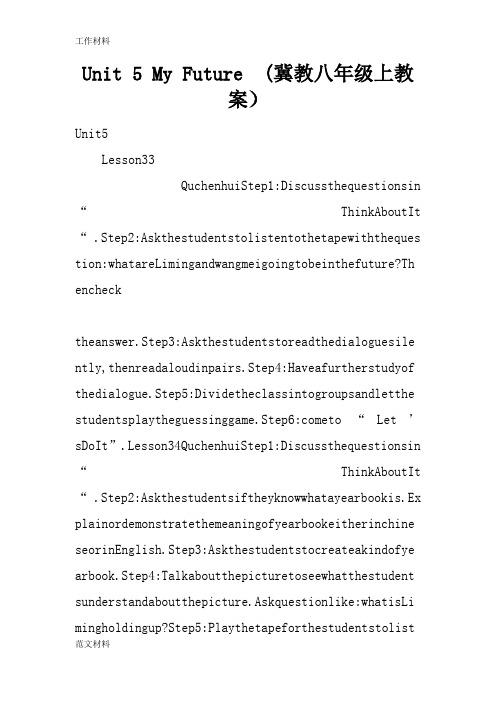
Unit 5 My Future (冀教八年级上教案)Unit5Lesson33QuchenhuiStep1:Discussthequestionsin “ThinkAboutIt “.Step2:Askthestudentstolistentothetapewiththeques tion:whatareLimingandwangmeigoingtobeinthefuture?Th enchecktheanswer.Step3:Askthestudentstoreadthedialoguesile ntly,thenreadaloudinpairs.Step4:Haveafurtherstudyof thedialogue.Step5:Dividetheclassintogroupsandletthe studentsplaytheguessinggame.Step6:cometo“Let’sDoIt”.Lesson34QuchenhuiStep1:Discussthequestionsin “ThinkAboutIt “.Step2:Askthestudentsiftheyknowwhatayearbookis.Ex plainordemonstratethemeaningofyearbookeitherinchine seorinEnglish.Step3:Askthestudentstocreateakindofye arbook.Step4:Talkaboutthepicturetoseewhatthestudent sunderstandaboutthepicture.Askquestionlike:whatisLi mingholdingup?Step5:Playthetapeforthestudentstolisten.Step6:Haveadiscussionaboutthetext.Step7:Askthest ethesente nceslike:Iwantto---Ihopeto---IhopethatIwill.Step8:B eginunitproject.makesurethestudentsfullyunderstandwhattheproje ctrequiresthemtodo.Dividetheclassintosmallgroups.Ea chgroupthenchoosesapartnergroup.Studentsineachgroup makepredictionsforthefutureaboutstudentsinthepartne rgroup.Theyshouldmakeonepredictionforeverypersonint hepartnergroup.AskstudentstorefertoLesson33inthisun itforproperwording.Theyshouldalsobeencouragedtoexpe rimentwiththelanguagebywritingintheirownways.Instru cteachgrouptowritealistoftheirpredictions.Askthecla sstobreakintoitsgroups.Eachgroupexchangeitslistofpr edictionswithitspartnergroup.Everygroupshouldnowhav ealistofpredictionsfromanothergroup.onestudentfrome achgroupcanreadthepredictionsaloud,orstudentscantak eturnsreadingpredictionsonebyone.Everygroupwillthen discusswhethertheyagreewiththepredictions.Tourthecl assroomasthestudentstalk.Ifmanygroupsarehavingtroub leexpressingthemselvesinEnglish,stoptheclassandbrai nstormusefulvocabularywithstudents.youmaywishtomakealistontheblackboard.Foryourreference,hereisalistof usefulwords.might,maybe,hope,want,right,wrong,going to,may,,willwould,but,sometimes,usually,surpriseIwa nttoIhopetoIthink/Idon’tthinkGiveeachstudentapieceofpaper,allofthesamesize.Havet hestudentsdrawapictureofthemselvesinthefuture–howtheythinktheymightlookasanadult.Eachstudentwillt henwriteapredictionforhisorherownfuture.Attheendoft hissession,collectthesepapers.Putthemintoabinderofp redictionsfortheclass.Leavethisbinderofpredictionso utwherestudentsmaylookthroughit.Iftheprojectcannotb efinishedinonelesson,itcanlastfortwoorthreelessons. Lesson35Step1:Greatyourstudents,Helpthestudentsrespondinana ppropriateway.Ask,’who’sonduty?’Listentothestudents’sreport.makesurethenextstudentfor“who’sonduty?”knowswhoheorsheisfornexttime.Ifyouhavetime,youmight asktheclasstotrythefollowingtonguetwister:Abigblackbugbitabigblackbear,madethebigblackbearbleedblood.S tep2:Giveyourclassmatesorfriendssomeadvicebysayingi mperativesentences.Step3:cometoProject2.what’syouradvice?Let’smakeanadvicediamond.Explainthatadvicediamondsarepo pularinNorthAmerica.Studentsthereenjoyplayingwithth eabigpieceofpaper,sothatallthestudentscanseewh atyouaredoing.Helpthestudentstowritetheadvicedown.B eginunitproject2.Instructthestudentshowtomakean “advicediamond”.Refertotheillustratedinstructions onthenexttwopages。
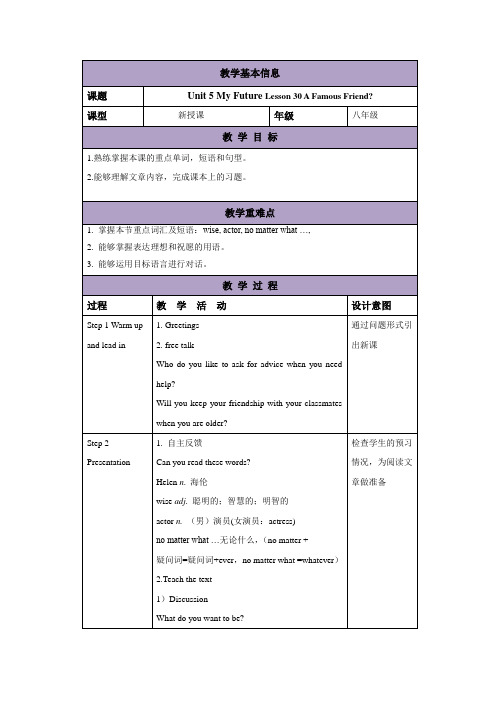
Step 3 Practice Let’s do it
完成书中77页1-3的练习题提高学生的知识运用能力
Step 4 Sum up 今天我们学习了:
句型
I’m not going to be a basketball player when I grow
up.
Or maybe I will be an actor on TV.
Step 5 Homework 1.Choose a good friend and give him or her some advice about his or her future.
2.朗读(第82页Lesson 31)课文,并上传语音
要求:阅读课文,把不理解的短语,句子用红笔做上记号。
学生将自己朗读语音上传到101平台
板书设计
Lesson30 A famous Friend?
Helen
wise
actor
no matter what
Target Language:
I’m not going to be a basketb all player when I grow up.
Or maybe I will be an actor on TV.
教学反思
利用课件中的图片学习新单词及短语;通过听力任务的完成,强化学生对语言目标的认识;通过Pair work活动,进行口语交际活动,提高学生的知识运用能力。
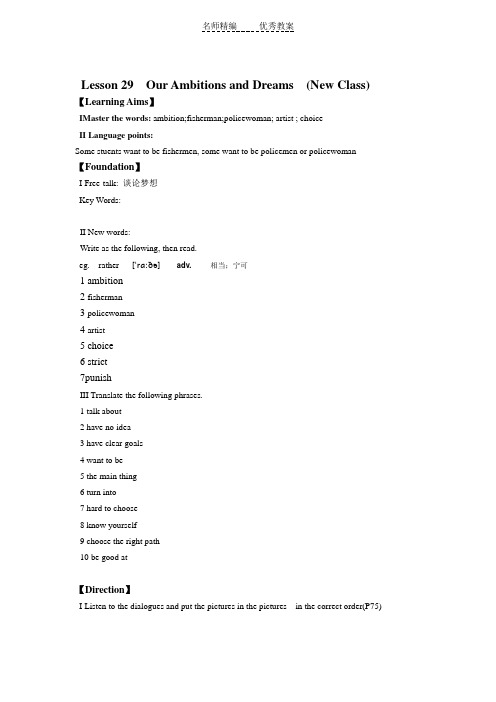
Lesson 29 Our Ambitions and Dreams (New Class) 【Learning Aims】IMaster the words: ambition;fisherman;policewoman; artist ; choiceII Language points:Some stuents want to be fishermen, some want to be policemen or policewoman 【Foundation】I Free-talk: 谈论梦想Key Words:______________________________________________________________________________II New words:Write as the following, then read.eg. rather [ˈrɑ:ðə]adv. 相当;宁可1 ambition2 fisherman3 policewoman4 artist5 choice6 strict7punishIII Translate the following phrases.1 talk about __________2 have no idea __________3 have clear goals ______4 want to be __________5 the main thing _6 turn into_______7 hard to choose ______8 know yourself__________9 choose the right path________10 be good at _____________【Direction】I Listen to the dialogues and put the pictures in the pictures in the correct order(P75)II Read and answer.1 What is the email about?2 What’s the main thing to think about when you choose a job?3 Why does Li Ming hope to be a teacher like Ms. Liu4 How many kinds of jobs can we find in the emailis__________________________________________【Self-check】Translate the sentences.1 Some of us have no idea__________________________________________2 Some of us have very clear goals __________________________________________3 What will I be when I grow up? __________________________________________4 She encourages us to work hard, but she never punishes us.__________________________________________5 Are you taller this year?__________________________________________【Consolidation】Read again to have a further understanding.【Expansion】按要求写出单词1 punish (单三)_______2policeman( 复数)______3 policewoman( 复数)________【Assignment】1 Finish off Part3 on Page75.2 Preview lesson30.3 Recite the words and read the text.Lesson 30 A Famous Friend? (New Class)【Learning Aims】I Master the words: wise; actorII Language points:No matter what.Review the simple past tense【Foundation】I 写出下列词的过去式givesaywillaskII New words: Write as the following, then read.eg. rather [ˈrɑ:ðə]adv. 相当;宁可1 wise2 actorIII Judge the tense.(判断时态)1 she gave me some advice._________________________________________2 Now I’m making my poster. __________________3 I watered my seed._________________4 I’m going to be a farmer._________________________________________5 I’m drawing a flower bud. ____________________【Direction】I Listen and write true or false.1. Danny is going to be a basketball player when he grows up. ( )2. Helen gives advice to people on the phone ( )3.Danny would like to ge a famous movie star someday ( ) II Read and answer.1.What question did danny ask Helen?2.What’s Helen’s advice for Danny?3. Will danny and Li Ming be friends when they become fich?【Self-check】将下列句子改为一般过去时态。
Unit5MyFuture(冀教八年级上教案)unit 5 lesson 33 quchenhui step 1: discuss the questions in “think about it “. step 2:ask the students to listen to the tape with the question :what are li ming and wang mei going to be in the future ?then check the answer . step 3:ask the students to read the dialogue silently , then read aloud in pairs . step 4:have a further study of the dialogue . step 5: divide the class into groups and let the students play the guessing game . (guess what am i going to be when i’m older ?) step 6:come to “let’s do it”. lesson 34 quchenhui step 1:discuss the questions in “think about it “. step 2:ask the students if they know what a yearbook is . explain or demonstrate the meaning of yearbook either in chinese or in english . step 3:ask the students to create a kind of yearbook . step 4:talk about the picture to see what the students understand about the picture . ask question like :what is li ming holding up ? step 5:play the tape for the students to listen . step 6:have a discussion about the text . step 7:ask the students to work in groups .predicttheir future . use the sentences like :i want to ---i hope to ---i hope that i will . step 8:begin unit project 1. make sure the students fully understand what the project requires them to do . divide the class into small groups . each group then chooses a partner group . students in each group make predictions for the future about students in the partner group . they should make one prediction for every person in the partner group . ask students to refer to lesson 33 in this unit for proper wording . they should also be encouraged to experiment with the language by writing in their own ways . instruct each group to write a list of their predictions . ask the class to break into its groups . each group exchange its list of predictions with its partner group . every group should now have a list of predictions from another group . one student from each group can read the predictions aloud , or students can take turns reading predictions one by one . every group will then discuss whether they agree with the predictions . tour the classroom as the students talk . if many groups are having trouble expressing themselves in english , stop the class and brainstorm useful vocabulary with students . you may wish to make a list on the blackboard . for yourreference , here is a list of useful words . 共4页,当前第1页1234 might ,maybe , hope , want , right , wrong , going to (not going to ), may (may not ),,will would , but , sometimes , usually , surprise i want to i hope to i think /i don’t think give each studenta piece of paper , all of the same size . have the students draw a picture of themselves in the future –how they think they might look as an adult . each student will then write a prediction for his or her own future . at the end of this session , collect these papers . put them into a binder of predictions for the class . leave this binder of predictions out where students may look through it . if the project cannot be finished in one lesson , it can last for two or three lessons . lesson 35 step 1:great your students ,help the students respond in an appropriate way . ask ,’who’s on duty ?’listen to the students’s report . make sure the next student for “who’s on duty ?”knows who he or she is for next time . if you have time , you might ask the class to try the following tongue twister :a big black bug bit a big black bear , made the big black bear bleed blood . (to save time , it is advisable for you to write it on a large sheet of paper and bring it to the class .) step 2:giveyour classmates or friends some advice by saying imperative sentences . step 3:come to project 2.what’s your advice ?let’s make an advice diamond . explain that advice diamonds are popular in north america . students there enjoy playing with them .use a big piece of paper , so that all the students can see what you are doing . help the students to write the advice down . begin unit project 2 . instruct the students how to make an “advice diamond ”.refer to the illustrated instructions on the next two pages 。
冀教版英语八上Unit 5《My Future》(Lesson 27-28)英文教学设计一. 教材分析冀教版英语八上Unit 5《My Future》(Lesson 27-28)主要讲述了关于学生对未来职业规划的讨论。
本单元通过介绍不同职业的特点和要求,引导学生思考自己的未来,并学会用英语表达自己的职业规划和梦想。
Lesson 27主要介绍了几种常见的职业,如医生、工程师、教师等,并通过对话形式展示了人物对这些职业的看法。
Lesson 28则以小组讨论的形式,让学生学会描述自己的未来职业规划。
二. 学情分析八年级的学生已经掌握了基本的英语语法和词汇,具备一定的听说读写能力。
但他们在口语表达和小组讨论方面仍需加强。
此外,学生对未来职业规划的认识尚不明确,因此在教学过程中,教师需要引导学生思考自己的兴趣和优势,帮助他们树立正确的职业观念。
三. 教学目标1.知识目标:学生能够掌握与职业相关的词汇和表达,如doctor、engineer、teacher等,并学会用英语描述自己的未来职业规划。
2.能力目标:学生能够在小组讨论中用英语表达自己的观点,提高口语交流能力。
3.情感目标:学生能够认识到不同职业的特点和要求,树立正确的职业观念,为自己的未来做好规划。
四. 教学重难点1.重点:职业相关词汇的掌握和运用,以及用英语描述自己的未来职业规划。
2.难点:如何在小组讨论中流畅地用英语表达自己的观点,并在交际中运用所学知识。
五. 教学方法1.任务型教学法:通过设置各种任务,让学生在实践中学会运用所学知识。
2.交际法:鼓励学生参与小组讨论,提高口语交流能力。
3.情境教学法:创设真实情境,让学生在具体环境中学会表达。
六. 教学准备1.教材:冀教版英语八上Unit 5《My Future》课本、练习册。
2.课件:制作与课程内容相关的PPT,包括职业图片、词汇卡片等。
3.视频材料:关于不同职业特点和要求的短视频。
4.课堂活动用品:卡片、贴纸等。
Unit 5 My futureLesson 25 I want to Be a Teacher! (two periods) Teaching Content :1.The words and expressions that must be grasped : future, might, doctor, carefully, sick, should, in the future2. The words that you can only know: scary, be nice to, So is next week.3. Talking about the future.Teaching Aims:1. Enable students to express their hopes and wishes.2. Help the students to learn to predict their future life and their jobs.3.Understanding the dialogue meaning.Teaching Important Points1. Predict their future life and jobs and the future tense.2.Talk about your plan and what you will do.Teaching Difficult Points: The future tense.Teaching ways: Reading and discussing.Lessoning Aids :Audiotape, recorder, sliders,flashcards, pictures Type of lesson: New lessonTeaching procedure:一、温故知新。
Check some words and phrases of unit4.二、激情导入。
Lesson 30 A Famous Friend?教学目标通过本课的学习,学生能够:1.根据丹尼给李明的回信内容,了解如何讨论自己的未来职业,思考并探索自己的优势和劣势,形成信息结构图。
(学习理解)2.介绍不同的职业选择,能自主地确定未来的目标是什么,以及需要采取哪些步骤来实现这些目标。
(应用实践)3.运用本课所学句型,结合信息结构图,用英语讨论自己的未来规划,并学会给予和接受积极的建议或者反馈。
(迁移创新)语篇研读What:本课语篇是一封电子邮件,主要介绍了丹尼给李明回信谈论未来的职业。
Why:通过本单元的学习,让学生明确自己未来的目标,并为自己的目标而努力学习。
How:语篇先介绍丹尼不知道自己将来做什么,海伦给他的建议是当一名演员或明星。
丹尼表示不论自己将来做什么,他永远是李明的朋友。
教学过程设计理念:以《义务教育英语课程标准(2022年版)》核心素养为导向,以单元主题为引领,基于语篇的育人理念,体现《义务教育英语课程标准(2022年版)》“学思用创”的英语学习活动观和“教—学—评”一体化设计理念。
Activity 5: Language points通过知识点的学习,解决后续学习中的问题nguage points.(1)much修饰形容词或副词比较级(2)write…to sb.(3)work for(4)give sb. advice=give advice to sb.(5)no matter what=whatever2.Do the exercises in PPT.教师观察学生是否能够理解、掌握重要知识点,是否能够独立完成相关的练习题设计意图语言点的学习有助于学生应对答题过程中遇到的困难【学习理解】板书设计Lesson 30 A Famous Friend?作业设计基础型作业:Review the useful words and phrases in this lesson and finish the exercise book.实践型作业:Choose a good friend and give him or her some advice about his or her future.教学反思。
Unit 5 My Future【本讲教育信息】一. 教学内容:Unit 5 My Future(L33—L36)1. 重点单词。
n. future doctor predictionyearbook ambition advicediamond replyv. might should staypredict choose spellreply becomeadj. scary sick oppositerich pooradv. carefully someday somewhereconj. as ifpron. nobodyprep. between2. 重点短语。
in the future 在将来too many/much 太多……be nice/good to …对……好no matter what 无论in the opposite 在……的相反处give advice to …给……提建议in ten more years 再过十年3. 重点句子。
So is next week and next year. 下星期和明年也一样。
Fast is the opposite of slow. “Fast”是“slow”的反义词。
I know for sure . 我确实知道。
I hope to see your new photos . 我希望看到你的新照片。
4. 语法。
Hope and wish.(希望和祝愿)二. 重点、难点解析及词语辨析。
1. Sometimes it’s scary t talk abou t the future. 有时谈起将来是很吓人的。
(L33)It is+adj.+(for sb.) +to do sth. 是一个强调句,意为“做……事情很……”句中it为形式主语,真正的主语是后面的动词不定式,例如:①It is very easy to learn English. 学习英语很容易。
②It is important for us to learn a foreign language.对我们来说学好一门外语很重要。
2. Y ou’re always helping people.你总是帮助别人。
(L33)这是一个现在进行时态的句子。
现在进行时态有时可代替一般现在时,表示一个经常重复的动作或状态,常带有always等以表达说话人的某种感情,如赞叹、埋怨、厌烦等。
例如:①Lei Feng is always helping others.雷锋总是帮助别人。
②He is always talking.他老是爱说话。
3. You look hot. 你好像发热。
(L33)look 连系动词,“看起来,好像,显得”He looks strong.他看上去很结实。
The girl looks like her mother.这女孩看上去像她的母亲。
▲连系动词的分类※表状态的a. be, seem等。
①It’s hot today.今天很热。
b. look 看起来,sound听起来,feel 摸起来,taste 尝起来,smell 闻起来等感官动词也属于系动词。
②Mr Li looks quite young.李先生看起来很年轻。
③Her voice sounds sweet. 她的声音听起来很甜美。
※表示状态变化的几个词,become, get, grow, turn, fall等④The trees turn green in spring. 春天树都变绿了。
⑤He has fallen ill. 他已经病倒了。
4. I hope to be a good teacher. 我希望成为一名好老师。
(L34)hope 是及物动词,意思是“希望”,后面可以接动词不定式或从句作宾语,即hope to do sth. 或 hope+(that)从句,例如:①I hope to go to the park tomorrow.我希望明天去公园。
②I hope that you can go to the park with us tomorrow.我希望你明天能和我们一起去公园。
注意:hope不能用 hope sb. to do sth.结构。
链接:wish 也表示“希望”,常用搭配有:wish to do sth. 希望做某事wish sb. to do sth.希望某人做某事wish +that 从句希望……5. everyone ( L34) pron. (同everybody)“人人,每人”辨析:everyone 与 every one我们每个人都有工作的权力。
正:Every one of us has the right to work.误:Everyone of us has the right to work.▲everyone 可用介词短语做定语,但习惯上不能用of短语做定语,如:He knows everyone in our school. 他认识我们学校里的每个人。
▲everyone(=everybody)只指人;而every one还可指物。
Every one of the apples is red. = Every apple is red. 每个苹果都是红色的。
6. other, one…the other, the others 与 another (L34)※other adj.“其他的,其余的”,在句中作定语,后跟n.复数※the other 常与one搭配构成“one…the other…”句型,表示两个人或物中的另一个或另一部分。
※the others 表示特指范围内的“其余的人或物”如:My aunt has two daughters.One is a doctor, the other is a teacher.我姑姑有两个女儿,一个是医生,一个是老师。
※another 是表示三个以上的人或物中同类的另一个;another+数字=数字+more。
I don’t want this apple. Please give me another. (=Please give me one more.)我不想要这个苹果,请给我另一个吧。
7. Give your friends good advice for the future!给你的朋友关于未来的好建议。
(L35)advice n.“劝告,建议,意见”。
为不可数名词。
如:Can you give me a piece of advice? 你能给我出个主意吗?advice 的动词形式是 adviseShe advised me to finish the work myself.她建议我自己完成这项工作。
8. Rich,poor, somewhere between? 是富裕还是贫穷?(L36)rich adj.“富的;有钱的;丰富的;贵重的”▲“the+形容词”表示一类人或事物the rich 表示富人们常见的还有:the poor 穷人们;the young 年轻人;the old 老人;the wise 聪明人;the true 真的;the false 假的The young are always proud of their age.年轻人总是以自己的青春骄傲。
The poor should be helped. 穷人们应该被帮助。
9. No matter what I become. 无论我变成什么样子。
(L36)(1)no matter what =whatever 无论、不管什么。
其他的还有:no matter how= however 不管怎样,无论怎样no matter when= whenever 不管什么时候,无论什么时候no matter where= wherever 不管在哪里,无论哪里no matter who=whoever 不管谁,无论谁①Don’t trust him, no matter what he says.不管他说什么都不要相信他。
②No matter where she goes,I will follow her.不管她走到哪儿,我都跟着她。
(2)become v. 成为;变得③ He became a great man ten years later . 十年后,他成为了伟人。
※become (be) interested in sth./ soing sth.对……感兴趣④The little boy became interested in science.这个小男孩变得对科学感兴趣起来。
▲常用于表示变化的系动词:become, come, fall, get, go , grow, turn⑤The days get longer and longer in spring. 在春天,天变得越来越长。
⑥The egg has gone bad. 这个鸡蛋已经坏了。